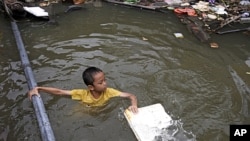NEW DELHI —
Present warming trends could roll back decades of development and exacerbate poverty in some of the world’s poorest regions in South Asia, South East Asia and Sub-Saharan Africa, according to a new World Bank study, which calls for urgent action to reverse global warming because the window for action is narrowing rapidly.
From declining food production to water shortages, more extreme heat waves to floods, the picture painted by the new World Bank report is grim.
The report called "Turn Down the Heat," follows up on an earlier study that found Earth could be warmer by two degrees centigrade in the space of one generation, and by four degrees by the end of this century, if action is not taken to reduce carbon emissions. Today's temperatures are 0.8 degrees centigrade above pre-industrial levels.
The report focuses on the impact of such warming in the regions that will be hardest hit: South Asia, South East Asia and Sub-Saharan Africa.
It finds that, in Sub-Saharan Africa, warming by two degrees centigrade will significantly reduce crop yields, impacting food security. Loss of savanna grasslands will threaten pastoral livelihoods.
In South Asia, the monsoon will become unpredictable and the region could suffer more extreme droughts and floods. Water in major river basins such as the Indus and the Ganges will reduce further, impacting food security for some 63 million people. Coastal cities such as Kolkata and Mumbai ad Bangladesh are “potential impact hotspots” threatened by floods due to rising river and sea levels.
Aross South East Asia rising sea levels, more intense and tropical cyclones and loss of marine ecosystems will adversely impact rural livelihoods. The World Bank country director in India, says the impact of global warming will fall hardest on the poor.
“The real point to us is that the poor are even more vulnerable than the not so poor because they are simply less able to protect themselves," Onno Ruhl said. "That is the sad part of the story, the most vulnerable will be hit the most.”
The World Bank is urging individuals and governments to make all choices through a “climate lens” and work toward aggressive national carbon-emission-reduction targets.
Officials say individuals, for example, should buy the most energy efficient gadgets, instead of those that look the “glossiest.”
Ruhl says climate change is getting higher on their list of priorities of policy makers in India and other countries, but much more remains to be done.
“Most governments when you talk to them about it, they will recognize it is a problem. When they make choices they do the same as we do with the refrigerator, they just buy whatever looks the glossiest," Ruhl said. "I think that is where the challenge is.”
The report calls for countries to take urgent action to build resilience through climate-smart agriculture, flood defenses, drought and heat resistant crops, improved ground water management, and coastal infrastructure.
From declining food production to water shortages, more extreme heat waves to floods, the picture painted by the new World Bank report is grim.
The report called "Turn Down the Heat," follows up on an earlier study that found Earth could be warmer by two degrees centigrade in the space of one generation, and by four degrees by the end of this century, if action is not taken to reduce carbon emissions. Today's temperatures are 0.8 degrees centigrade above pre-industrial levels.
The report focuses on the impact of such warming in the regions that will be hardest hit: South Asia, South East Asia and Sub-Saharan Africa.
It finds that, in Sub-Saharan Africa, warming by two degrees centigrade will significantly reduce crop yields, impacting food security. Loss of savanna grasslands will threaten pastoral livelihoods.
In South Asia, the monsoon will become unpredictable and the region could suffer more extreme droughts and floods. Water in major river basins such as the Indus and the Ganges will reduce further, impacting food security for some 63 million people. Coastal cities such as Kolkata and Mumbai ad Bangladesh are “potential impact hotspots” threatened by floods due to rising river and sea levels.
Aross South East Asia rising sea levels, more intense and tropical cyclones and loss of marine ecosystems will adversely impact rural livelihoods. The World Bank country director in India, says the impact of global warming will fall hardest on the poor.
“The real point to us is that the poor are even more vulnerable than the not so poor because they are simply less able to protect themselves," Onno Ruhl said. "That is the sad part of the story, the most vulnerable will be hit the most.”
The World Bank is urging individuals and governments to make all choices through a “climate lens” and work toward aggressive national carbon-emission-reduction targets.
Officials say individuals, for example, should buy the most energy efficient gadgets, instead of those that look the “glossiest.”
Ruhl says climate change is getting higher on their list of priorities of policy makers in India and other countries, but much more remains to be done.
“Most governments when you talk to them about it, they will recognize it is a problem. When they make choices they do the same as we do with the refrigerator, they just buy whatever looks the glossiest," Ruhl said. "I think that is where the challenge is.”
The report calls for countries to take urgent action to build resilience through climate-smart agriculture, flood defenses, drought and heat resistant crops, improved ground water management, and coastal infrastructure.




